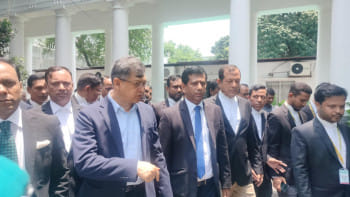Tall talks in talk-shows ...
THE all time low scoring of BNP and Jamaat in the recently held national election tournament has puzzled friends and foes alike. The alliance team played more like our national cricket team, with untested players, no practice, low morale and beset with "injuries." The captain of the team looked disarrayed, having no clue of who was a bowler and who was a batsman. And the team looked like a motley band ready for a drubbing. And drubbing they got indeed.
The late night results had left most people -- pro-BNP, pro-Awami League and pro-Jamaat -- gasping for oxygen, some in ecstasy, some in agony. True, even Awami League (AL) had no clue of what was going to transpire in the late evening when counting began at various poll centres. The common guess was 160 to 170 seats for AL, 80 for BNP and the rest for the other parties. The incredible figure of 230 for Awami League alone made even a staunch AL supporter say in amusement that any senior AL leader would have wanted a maximum 190 seats to be on the safe side. Maybe he is right. Maybe he is not right.
And since the day after, political and poll analysts of all colours and hues have been dissecting the results to get to the bottom of the "mystery," as the BNP-Jamaat loyalists prefer to term it. The analysts have surfaced with all sorts of "reasons" and are now trying to find out what factors went behind creating those "incredible reasons." Well, by now millions of words have been printed in the print media in analysing the reasons, but, in their search, they overlooked one or two major reasons, which I believe had impacted the results. Here they are.
Dear readers, if you backtrack a little and try to recall the talk-shows that had eaten up valuable air time of the numerous electronic channels you will develop an insight into the whole issue. Since the caretaker government took over power with the support of the army, a group of "experts" comprising journalists, university teachers, academics, politicians, political analysts and law practitioners began to decipher the constitution, citing article after article to prove how unconstitutional the caretaker government was. Strange indeed, most of them possibly had never studied the constitution as vigorously before as they did during the tenure of the caretaker government.
They spared no opportunity to stress how the fundamental rights of the politicians were being battered by the agents of the "illegal government," and how the people were being deprived of the opportunity of exercising their democratic right of self-governance. They wanted national election within three months from the caretaker government. They also began to smell the smoke of intrigue in the army camps, which many believed were ready to seize total state power!
The other reason was people's disappointment with senior lawyers. They watched in dismay how some senior lawyers of repute had been giving strong arguments in defence of criminals who had looted the country's coffers. These lawyers became over-enthusiastic in arranging bails for the criminals or managing them hospital cabins. These lawyers prepared documents exploiting the loopholes in the existing laws of the land to make the cases appear weak and untenable. People wanted to see justice, so they reacted when the criminals came out of jails one after another. People blamed the lawyers and the flaws in the laws.
Thus, the tall talks in talk shows, in a bid to obliterate the memory of the blatant corruption and looting during the tenure of the 4-party alliance government, went on and on, unrelenting. But did the learned participants succeed in changing the opinion already formed by the common masses in their minds? No, they did not. The more the experts talked, the more the people rejected their arguments, and became more resolute to bring about a change.
So, I believe that if the talk-show experts of BNP-Jamaat gharana had rather openly and bitterly criticised the 4-party alliance for the misrule, nepotism, institutionalisation of corruption, covert support to fundamentalists, repression on opposition political activists, tender hijacking and so on, things might have been different today. They had tried people's patience for a bit too long. They had the notion people would fall for the semantics. But it did not happen. The poll results say so.

 For all latest news, follow The Daily Star's Google News channel.
For all latest news, follow The Daily Star's Google News channel. 



Comments